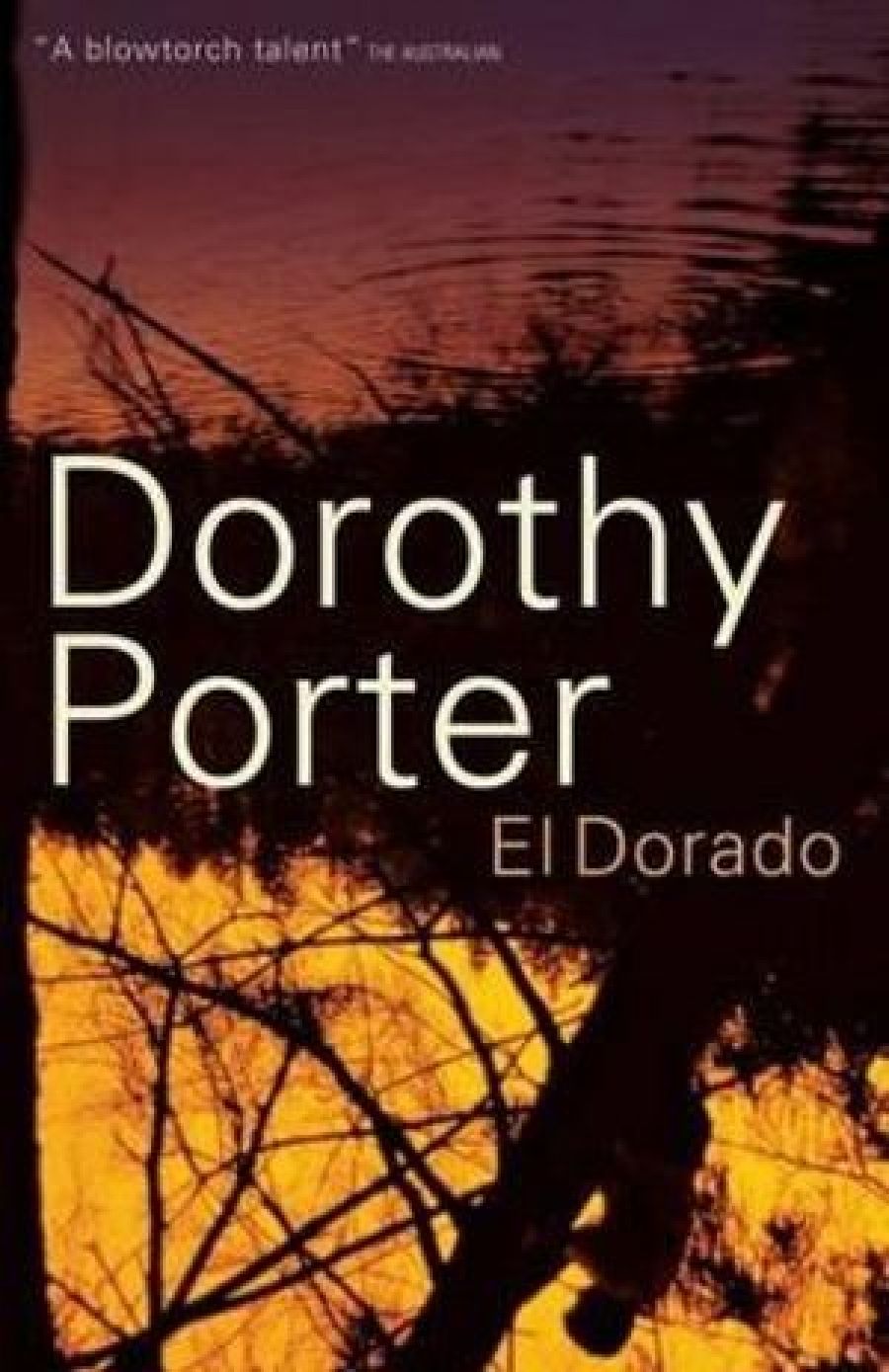
- Free Article: No
- Contents Category: Fiction
- Review Article: Yes
- Online Only: No
- Custom Highlight Text:
Dorothy Porter’s verse novels are delicious and distancing, formal, fiery and frenetic. With the possible exception of What a Piece of Work (1999), they get better and better. Early on, El Dorado smacks you in the face and strokes your imagination with a ‘little girl’s / dead hand / … sticking stiffly / up / as if reaching / to grab an angel’s / foot’. Framed by epigraphs from Gilgamesh, Peter Pan and Wallace Stevens, an enigmatic gesture of thanks ‘for the magic snakes’, a stanza from Yeats’s ‘The Stolen Child’ and a prologue invoking the ‘thick alien ice’ of Europa, Porter’s latest verse novel is contextualised with multiple, allusive legendry. This is a work that invokes and reimagines, iconoclastically, various fantasies (Atlantis, Neverland, El Dorado), mythologies (Greek, Roman, Christian) and pop-ular culture fantasists such as Disney, the Beatles, the Flintstones, and literary allusions to Shakespeare, Keats, Donne, Dickinson, Stevenson, Doyle, Carroll, Twain. El Dorado is as much about how fantasy works as it is a fantastic detective narrative.
- Book 1 Title: El Dorado
- Book 1 Biblio: Picador, $32.95 pb, 380 pp
- Book 1 Readings Link: booktopia.kh4ffx.net/WxbKO
Like Quentin Tarantino, Porter is a skilful genre-bender and grafts her reworked fantasies onto a crime novel structure – to uncover the identity of a serial child-killer. Fantastic, perverse, playful, realistic, El Dorado becomes, in a postmodern way, a satire whereby the seriousness of fantasy and the playfulness of noir crime bounce off each other: ‘fairy floss / is the weapon / we’re looking for.’ Our impossible needs for fantasy and affection create the monsters we despise: ‘good’ creates ‘evil’. Bill, the detective, is fallible, melancholic, distracted by his hopeless love for his childhood sweetheart Cath, who is now a lesbian fantasy film-maker. They are the protagonists we feel for and are annoyed by in all their bumbling humanity, but it is they who have created the child-killer in the normal, spiteful antipathies of their own pasts. It is a credit to Porter that she prompts the realisation that the intensity of childhood hatreds is incomprehensible to adults but may persist and be sanctioned by the fantasies which we admire. The image of the killer clapping his hands before he is gilded (as the mythic warrior El Dorado) and transformed in the final consuming fire, in which baby rabbits ‘sing’ and fairy wings ‘sizzle’, is both an image of suicide and an endorsement of belief in fairies as in Peter Pan.
Central to El Dorado is the idea that fantasy is never an escape to another world so much as an engagement with it from a different point of view. It is a way of getting closer to ‘reality’, of critiquing and exploring it. In this sense, El Dorado takes up the view of Hugh Crago and others that fantasy is an endlessly accommodating genre, a mode of ingenious and seductive compromise. It can domesticate terror and make palatable the unthinkable unknown, partly because, says Cath, fantasy is a hunger: ‘longing to be entranced / longing to believe / in anything.’ Porter writes against the ‘ancient morality-encrusted words’ that fetishise the innocence of the child. She invites us to consider, with uncomfortable irony, that the ‘paedophile chancer’ offers a ‘good death … / just a little premature’, and this is in a tradition of religious poetry that goes back at least to Ben Jonson.
Porter’s language is often densely allusive, despite its apparent vernacular ease – another measure of her confidence and mature skill. It is operatic at times in its codification of literary and cultural complexity in an almost abbreviated form. Her verse novels are in part libretti and have always made grand gestures of an almost heroic scope: the rise and fall of a religion and its king and queen in Akhenaten (1992); falls from grace in both What a Piece of Work and The Monkey’s Mask (1994); ill-fated love against a cosmic background in Wild Surmise (2002). All have the scope of tragedy and are enmeshed in a sense of passion beyond realism, while foregrounding gritty ordinary human fallibility.
It has been said that the most usual plot in opera is summarised as a tenor seducing a soprano, assisted by an alto, from the grips of a bass-baritone. In El Dorado, Porter foregrounds a baritone, in league with an alto, who falls hopelessly in love with a serpentine soprano, in order to defeat a twisted tenor. Some will say that Porter’s narrative is flimsy and her characters unconvincing, but for me this is to misread the nuanced complexity of Porter’s sinuous and compelling poetry. Perhaps some words are overused – ‘toxic’, ‘feral’, ‘gut’, ‘wild’ – but El Dorado reclaims some words from oblivion, such as ‘limerance’. Other words are regretfully rejected as cliché (‘tsunami’) and other disparaged words are rehabilitated (‘slut’).
One of the fascinating things about any Porter verse novel is its dealing with sexuality as an (imaginative) experience that is both gendered, with defined roles, and as well is chaotic, eruptive (a recurring motif is the volcanic orgasm) and animalistic. What makes Porter’s portrayal of sexuality convincing is its anarchic ambiguity (remember ‘Nefertiti Rides Me’ from Akhenaten: although emerging from a lesbian encounter, it remains one of the best Australian poems about heterosexual or even married sex). In El Dorado, the snake is suggestive of a sinuous feminist sexuality and as a phallus, arousing and troubling a lesbian consciousness (see ‘Heavy Petting’ and ‘Peep Show’).
There are dozens of fine, powerful and subtle poems in this sequence, but, as with Porter’s other verse novels, the whole is greater than the sum of its parts. For my money, this mature and accomplished work proves that Porter outstrips Christopher Brennan and puts her at the top of the distinguished class of contemporary Australian poets when it comes to livres composés.


Comments powered by CComment